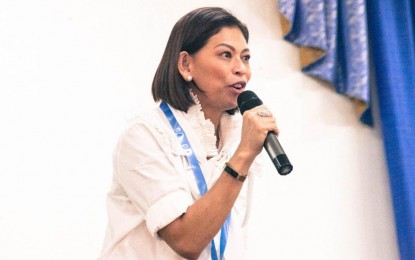
2nd District Marikina City Rep. Stella Luz A. Quimbo (PNA file photo)
MANILA – Marikina City 2nd District Rep. Stella Luz Quimbo on Wednesday noted the importance of House Bill (HB) No. 498, a measure seeking to institutionalize the Assistance to Individuals in Crisis Situation (AICS) program during a hearing by the House of Representatives Committee on Social Services.
In her sponsorship speech before the panel, Quimbo said the AICS program of the Department of Social Welfare and Development (DSWD) has been pivotal in helping Filipinos weather the drastic and far-reaching effects of the Covid-19 pandemic on their welfare.
“Through AICS, the DSWD has extended social assistance to almost 3 million individuals in crisis situations over a period of 17 months from the onset of the pandemic in our country in March 2020. Kitang-kita po natin ang halaga ng programang ito para sa mga kababayan nating nasa laylayan ng lipunan (We can see clearly the significance of this program to our countrymen in the grassroot level),” she said.
Notwithstanding the merits of the Mandanas-Garcia ruling, which fully devolves the delivery of basic services to local government units, Quimbo said HB 498 would institutionalize the AICS Program to ensure “undisrupted and sustained provision” of immediate relief to the marginalized sector in crisis situations.
To have a successful social protection program, the agency must have financial, administrative, technical, and technological capacity, she said.
Quimbo added that these are the agency’s comparative advantages over the local government, which has yet to build its capacity and support systems for its social protection programs.
She said over the years, the DSWD has built up its expertise and resources, and has instituted coordination mechanisms in rolling out its flagship programs such as the Pantawid Pamilyang Pilipino Program (4Ps).
The guiding principles of Executive Order No. 138 (or Full Devolution of Certain Functions of the Executive Branch to Local Governments) states that “functions related to the redistributive role of government should be best assigned to the national government”.
4Ps, a conditional cash transfer program, is a classic example of a redistributive program of the government to help the poor send their kids to school.
While the 4Ps help poor households transition out of poverty, Quimbo said the AICS prevents poor households from being pushed further into poverty.
Both national programs are effective interventions in keeping poor children in school and preventing them from dropping out, especially when their families face difficult situations such as natural disasters, crime and armed conflicts, health problems, the death of a family's main income earner, and so much more, she said.
“In the same manner that the institutionalization of 4Ps has helped reduce poverty in our country, it is my hope that we share the same conviction that the institutionalization of the AICS is helping reduce the vulnerability of our people,” she added.
To complement Mandanas ruling
Nueva Ecija Rep. Rosanna Vergara said the institutionalization of the AICS Program would complement the impending full implementation of the Mandanas ruling in 2024.
“The inclusion of the AICS Program in the devolution of programs and services of the Executive Department to the local governments under E.O. No. 138 dated June 1, 2021 should be studied assiduously,” she said.
She said devolving the AICS Program to the local government units would entail not only time to efficiently implement the program by hiring qualified and trained personnel, but it would also result in incurring capital and operating expenses, among others.
Vergara emphasized the need to institutionalize AICS Program so that there will be no disruption in the delivery of service to unfortunate Filipinos affected by crisis beyond their control.
She said AICS is one of the programs successfully implemented by the DSWD to uplift the flight of Filipinos in crisis situations.
She cited DSWD data showing a high utilization rate in 2020, surpassing its target of 877,444 clients, with an PHP8.7-billion allocation and recording 140 percent actual clients served, or around 1,224,270 beneficiaries, and disbursing 92.80 percent of its total allocation, or PHP8.1 billion.
In the wake of Severe Tropical Storm Paeng that recently ravaged many parts of the country, she said the AICS implementation is now made more accessible to the people as DSWD Secretary Erwin Tulfo ordered to simplify the guidelines for its implementation to hasten the distribution of the PHP1.2-billion assistance in the form of cash and food packs.
The House panel approved the creation of a technical working group that will consolidate into a substitute bill nine bills seeking to institutionalize the AICS Program. (with reports from Filane Cervantes/PNA)
